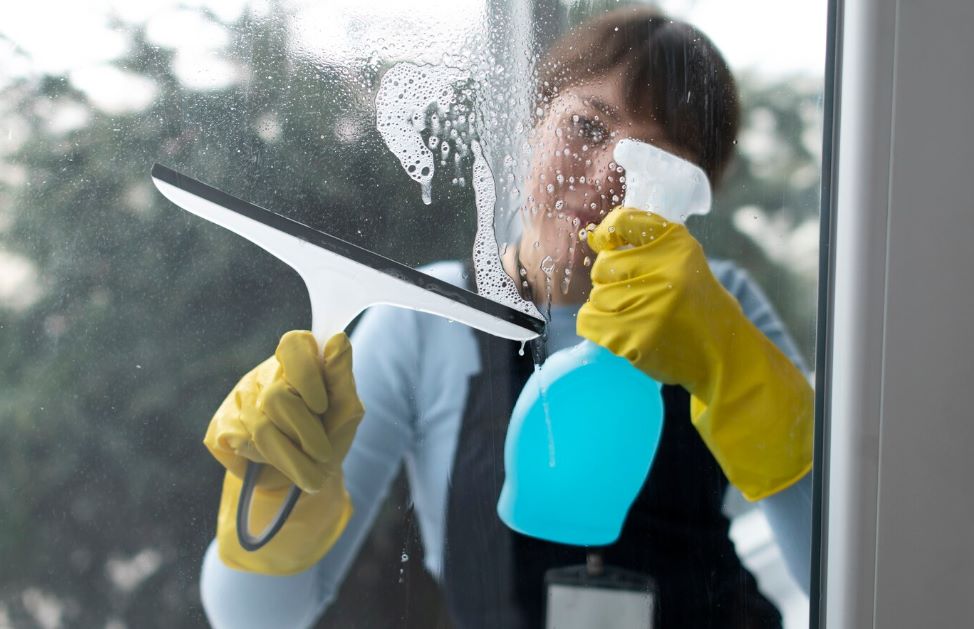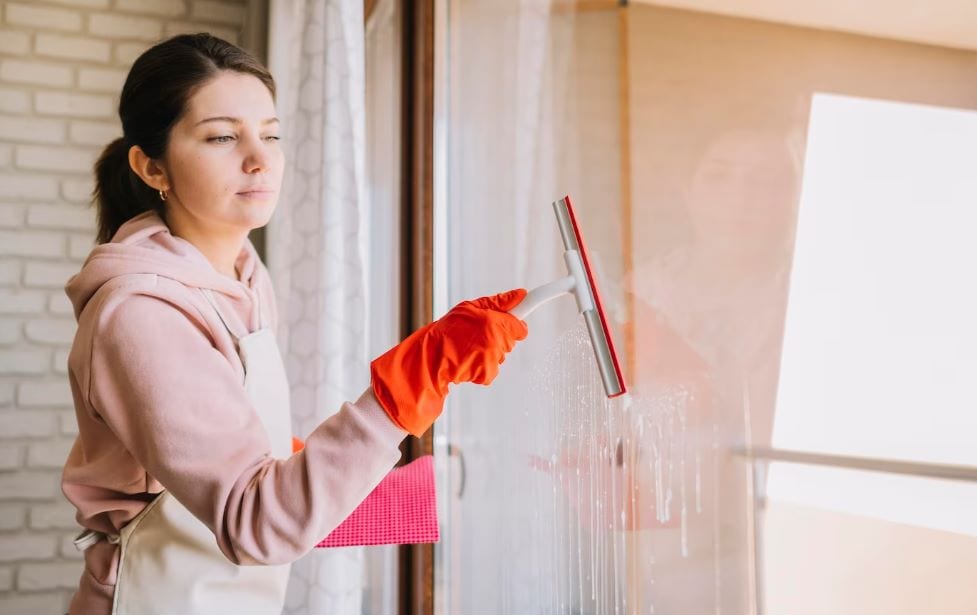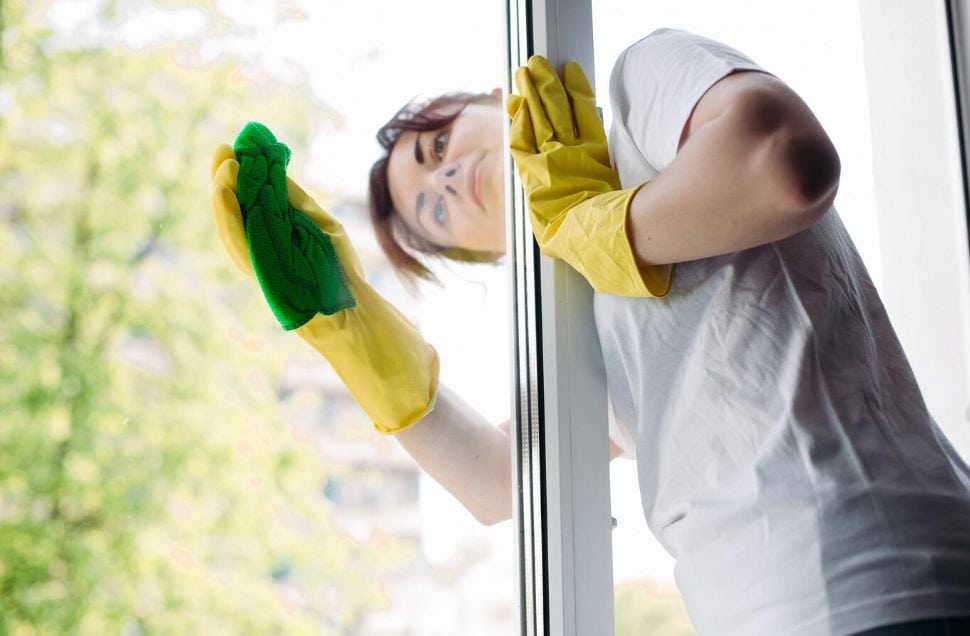While washing windows may seem like a chore, achieving sparkling results with only a little bit of time and energy is possible.
Everyone desires a spotless and aesthetically pleasing dwelling. Windows have a significant impact on a house's visual appeal and ambience. A spotless window lets in natural light and provides a clear perspective of the world outside.
Windows are always subjected to dust, filth, or rain since they protect us from the ever-changing weather. Windows must be cleaned periodically to look good.
The process of removing stubborn stains from windows can be laborious and time-consuming.
Preliminary Window Cleaning
Remove Persistent Stains

Hard water runoff, bird droppings, minerals, and other substances can cause dirt and grime on exterior windows, making them difficult to clean. If your indoor or outdoor windows have been marred, you can try one of these solutions:
- Use a cleanser that will remove mineral deposits, such as CLR. If there are any streaks on the windows, wet a sponge with cleanser and scrub them away. Water rinsing and regular cleaning can then be performed.
- Pure vinegar should be sprayed on the region and allowed to sit for at least five minutes. Sponge or towel the stain, then continue your regular cleaning routine.
- Make a paste with oxalic acid cleaner and water. Use a clean towel to gently apply the paste. Just wash as usual once you've rinsed off the paste.
- If you use a razor to scrape at a stain carefully, you can remove a crusty or gritty stain.
Remove Decals and Stickers
Sticky substances are a pain to remove off windows, whether you've used decals to keep birds from smashing into them or your kids love to decorate with stickers. However, a water spray bottle and a sharp plastic scraper are all required.
- Apply light water to the stickers and let them sit for a few minutes.
- Put light pressure on the scraper as you hold it at a 45-degree angle to the window. You can get under the stickers if you start at the bottom and scrape your way up. Get a towel and dry up the area.
Clean and Remove The Screens
Each time you clean your windows twice a year (inside and out), you should also clean the screens. Please take out the screens and clean them in a vacuum.
- Before and after wiping the screen down, please give it a little spray with a hose or a water-filled spray bottle.
- Warm water with a drop or two of vinegar or dish soap wiped down with a clean cloth or sponge can do the trick. Screens should be removed and given ample time to dry before being replaced.
Wash the Exterior Windows to Remove Grime
All sorts of grime, dirt, and pollution can accumulate on windows that face the outdoors. The first step in cleaning extremely unclean windows is to use a garden hose to remove the loose debris and dust from the glass and frames.
- If you don't have access to a hose, you can at least remove part of the grime with water and a lint-free towel. A pressure washer can also be used on the lowest setting.
Windows should be dusted or vacuumed.
Get all the glass, moulding, and nooks and crannies. If you do this, you will only redistribute dirt after cleaning it up.
- Put a wide towel in front of the window to catch any water or cleaning solutions before cleaning the inside.
Cleaning Windows From The Inside And Outside
Gather Your Tools and Supplies.
You'll need a few items to clean your windows on a basic level, including:
- Brush, sponge, or squeegee may be used.
- A drying squeegee made of rubber
- a lint-free or microfiber cloth for absorption
- Rag or other clean fabric
- Cleaning agent-filled bucket
- Large towel for indoor floor protection
Create a Cleaning Agent
Most experts agree that the best window cleaner is just a mixture of water and dish soap. If you try to clean your windows with a spray bottle and some paper towel or newspaper, you'll spread the dirt and the cleaning solution around.
You can construct a window cleaner by combining the following:
- Mix one teaspoonful of dish soap (6 ml) with two gallons (7.6 litres) of water.
- White vinegar and water, 50/50.
- Two cups (480 ml) water, one tablespoon (15 g) of cornflour (to prevent streaks), one-quarter cup (60 ml) of isopropyl (rubbing) alcohol, and one tablespoon (15 ml) of vinegar.
Clean The Windows
Windows with many little panes are easier to clean with a sponge, while bigger-picture windows require a squeegee. Here, wet your sponge in the cleaning solution. After wringing out the extra water, wipe off the entire glass, including the edges.
Use a squeegee or brush on an extension pole or broom handle to clean upper outdoor windows without a ladder. Another option is to use a window cleaner with a particular spray that can reach the second storey.
After washing a window, let it dry completely before going on to the next one. When washing or drying windows, more soap should be added to the water if the squeegee makes a lot of noise.
Wet Wiping The Windows
Use the squeegee's rubber blade to vertically brush the water away from the top down while cleaning tiny paned windows. Use horizontal lines for a photo window. The window should be cleaned from the top down.
Use a lint-free cloth to dry the blade between strokes, and overlap each stroke by a few inches (centimetres).
Maintain constant contact between the rubber blade and the window. Invest in a high-quality squeegee and sharpen its rubber blade for an easy approach to achieve streak-free window cleaning. Have a window cleaner on hand that won't leave streaks. When the rubber blade wears down, it will no longer create a tight seal and will start to leave streaks.
Wash the inside of the glass and dry it off.
Dry the affected window areas using an absorbent, lint-free cloth where water has spilt, dripped, or run down the glass. The window won't get streaks if you do this. Use a clean rag or cloth to dry the water off the window sill without damaging the frame.
Checklist of Things Not to Do While Cleaning Windows
Avoid using newspapers and other magazines.
Newspapers and magazines have long been used as a traditional window cleaner. They could cause ink bleed or scratching if used on glass. This could cause permanent damage to your windows, making their replacement very costly.
Cleaning Windows on a Hot Day is a Bad Idea
If you need to clean the windows, try to avoid it on a sunny day or early in the morning before the sun gets too hot. Why? Because scorching heat can cause the glass to streak and cause structural damage. For this reason, you should schedule your cleaning at a cloudy period early or late in the day.
Never Put Your Safety at Risk
Never put your safety at risk during the cleaning process. Cleaning windows is a dangerous job that comes with several potential hazards. To reach the upper windows, you will need to utilise a ladder. Taking such actions puts your life in serious jeopardy. You could get into an accident and break your windows. Harsh cleaning agents should be avoided at all costs.
Soap Should Be Used Moderately
Soapy water leaves residues that can promote the formation of moulds and mildew when used to clean windows. There is a risk that the expansion of such compounds will weaken or break the windows. After washing the windows, you should attempt to dry them off.
You can make the most effective homemade window cleaner right in your kitchen.
There are some benefits to using homemade window cleaners instead of store-bought options. You may make your bottle of glass cleaning solution for little to nothing, as many homemade cleaner recipes ask for items you probably already have lying around the house.
The benefits of the handmade version go beyond the lower cost. It's better for the environment, too. Natural chemicals are gentler than most pre-mixed cleaners; you'll save bottles from the trash. Because you understand every nuance of the recipe, you can tweak it to your liking if it falls short of your expectations. Try making this homemade window cleaner; you'll be amazed at the shiny, streak-free results.
Simple Method for Cleaning Windows at Home

Distilled water is best for homemade glass cleansers since it removes impurities and leaves no residue on the glass. This DIY window cleaner is quick to put together and can be tailored to your preferences by adding your prefered essential oil. Because of its acidity, vinegar works well as a homemade glass cleaner.
Get your water, vinegar, and any scented essential oils beforehand. The bright, crisp scent of lemon inspired our choice.
This is what you'll require:
- 1 litre of filtered water
- White vinegar, 1/2 cup
- Ten optional drops of essential oil
Put everything in a spray bottle and give it a good shake to blend.
A Homemade Window Cleaner Using Rubbing Alcohol
When used on glass surfaces, the addition of rubbing alcohol speeds up evaporation and lessens the likelihood of water spots. Since rubbing alcohol is a disinfectant, this DIY glass cleaner can also kill germs and bacteria on surfaces, unlike the first one.
This is what you'll require:
- 1/4 cup filtered water
- White vinegar, about 2 to 4 tablespoons
- Alcohol, Rubbing, 1/4 Cup
Make sure to follow the recipe's order while adding the components. To begin, fill a spray bottle with rubbing alcohol and vinegar. The second step is to add pure water. Toss together in a container and spray. Shake it well and then put the cover on it. Make sure everything is thoroughly combined before you use it.
DIY Window Cleaner using Dish Soap
You only need a small amount of dish soap to make it an efficient cleaning solution for glass. If you're cleaning a particularly dirty or oily surface, its grease-defeating powers will give you a leg up on previous cleansers. If you're sensitive to odours, you won't be bothered by the sour vinegar aroma.
This is what you'll require:
- Hot water, 16 ounces
- A small amount of non-abrasive dishwashing liquid
Collect the dish soap and hot water. If you want a flawless result, use distilled water. In a large bucket, mix up water and dish soap. Combine fully, then transfer to a spray bottle.
Caution Needed with Homemade Glass Cleaner
DIY cleaning solutions are simple and inexpensive, but care must be taken when different chemicals are combined. Here are some examples of highly poisonous mixtures:
- Combine vinegar with chlorine bleach.
- A mixture of bleach and ammonia
- Rubbing alcohol with bleach
- Vinegar with hydrogen peroxide
Toxic substances can be made by combining these. If you mistakenly combine them, you must leave the premises immediately.
Conclusion
After putting in some time and effort, you can make your home clean and nice to look at. Windows are very important because they let in natural light and give you a good view of the outside world.
Get tools and materials like a drying squeegee, a lint-free cloth, a clean fabric, a bucket full of cleaning solution, and a big towel to protect the floor inside. Then, clean the windows from the inside and the outside.
To clean windows with different panes, mix dish soap with water and dish soap. Then, use a sponge or brush to clean the windows.
After you wash a window, wait until it is totally dry before moving on to the next one. More soap should be added to the water if the squeegee is making a lot of noise.
To clean windows, brush water away from the top down with a squeegee that has a plastic blade. Dry the blade with a lint-free cloth between strokes, and make sure the rubber blade stays in touch with the window at all times. Newspapers and magazines should not be used to clean windows because they can scratch or bleed the paint. If you want to keep your windows clean, do it on a warm day or first thing in the morning before the heat gets too hot and damages the glass.
Don't put your safety at risk while you're cleaning; it's a dangerous job that could have risks. Soap shouldn't be used too much because soapy water leaves behind leftovers that can help mould and mildew grow.
Making your own window cleaner is cheaper and better for the world than buying one from the store. You can change the recipe to make it work better if it doesn't meet your needs. Natural chemicals are gentler than most cleaners that come already mixed. An easy way to clean your home windows is to use vinegar, rubbing alcohol, or distilled water. This glass cleaner is quick and easy to make at home, and you can change it to suit your needs.
Dish soap works well to clean glass, especially when the surface is dirty or oily. Put hot water and dish soap in a spray bottle and mix them together. But you need to be careful when you mix different chemicals together because you can make toxic things.
Content Summary
- Learn to achieve sparkling window results in little time.
- Spotless windows enhance a house's visual appeal.
- A clean window offers clear views of the outdoors.
- Protect your windows from dust, filth, and rain.
- Windows require periodic cleaning to maintain their look.
- Removing stubborn stains can be a demanding task.
- Solutions for persistent stains include cleansers like CLR.
- Pure vinegar can tackle tough window marks.
- Oxalic acid cleaner effectively removes window grime.
- Use a razor for crusty or gritty window stains.
- Removing decals and stickers made easier with water spray.
- Keep birds safe with decals on windows.
- A plastic scraper assists in sticker removal.
- Cleaning window screens is essential for overall cleanliness.
- Vacuum screens before washing for best results.
- Use a hose or spray bottle for preliminary screen cleaning.
- A touch of vinegar in warm water cleans screens effectively.
- Outdoor windows accumulate dirt and pollution.
- Use a garden hose to remove loose debris from windows.
- Dust or vacuum windows before deep cleaning.
- Lay a towel to catch drips when cleaning inside windows.
- Essential window cleaning tools: brush, squeegee, and lint-free cloth.
- Choose the right cleaning agent for optimal results.
- Dish soap and water make a reliable window cleaner.
- Avoid using a spray bottle alone for window cleaning.
- Sponges are ideal for windows with many small panes.
- Use a squeegee on extension poles for higher windows.
- Ensure windows are dried thoroughly after washing.
- A noisy squeegee may need more soap in the solution.
- For streak-free results, use a high-quality squeegee.
- Avoid newspapers for window cleaning to prevent ink bleed.
- Avoid cleaning windows in direct sunlight to prevent streaks.
- Prioritise safety when cleaning, especially with ladders.
- Moderate soap usage prevents mould and mildew formation.
- Homemade window cleaners offer cost-saving benefits.
- Making your window cleaner is eco-friendly.
- Adjust homemade cleaner recipes as per your preference.
- Distilled water is ideal for DIY glass cleaners.
- Vinegar's acidity makes it a potent cleaning agent.
- Essential oils can add a pleasant aroma to DIY cleaners.
- Rubbing alcohol in cleaners ensures quick evaporation.
- Alcohol-based cleaners also disinfect surfaces.
- Dish soap can tackle greasy window residues.
- Use non-abrasive dish soap for window cleaning.
- Homemade cleaning solutions require caution.
- Never mix vinegar with bleach; it's toxic.
- Combining bleach and ammonia can be hazardous.
- Avoid mixing rubbing alcohol with bleach.
- The vinegar and hydrogen peroxide combination is dangerous.
- Always ensure good ventilation when using DIY cleaning solutions.
Frequently Asked Questions About Cleaning Services
Yes, cleaning the frames and tracks can prevent dirt buildup and ensure your windows operate smoothly. Use a vacuum or a small brush to remove loose dirt and a damp cloth to wipe surfaces.
Use a ladder or extension pole, or hire a professional window cleaning service for hard-to-reach windows.
Avoid using vinegar on tinted windows, as it can damage the tint. Use a solution recommended by the tint manufacturer.
Use a small, soft brush or a toothbrush to access tight spaces and a cloth or sponge for the larger areas.
Proper ventilation, using a dehumidifier, or applying an anti-fog product can help prevent condensation and fogging on the interior of windows.
